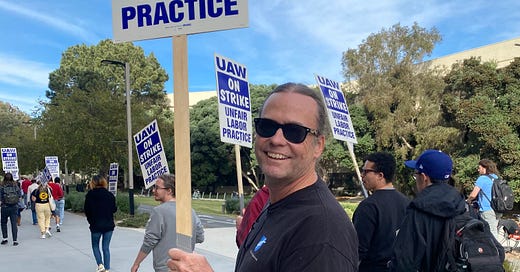Why I’m Learning to Love Corporate Democrats
Confession: I have finally turned the corner and seen the light. I’ve learned to love the logic of late capitalism and have pledged stop all my moaning about neoliberalism. Rather than slaving away in the labor movement as I’ve done for most of my adult life, it’s finally time that I give up the ghost and surrender to a Democratic agenda driven by corporate priorities with a little superficial wokeness and virtue signaling on the side.
Who needs all the nostalgic whimsy of the days of New Deal Democrats when I can simply come to terms with the fact that tech bros, the managerial class, and vaguely socially liberal suburbanites are the core of the Democratic party?
Thank God that Joe Manchin and Kyrsten Sinema saved us from ourselves and rescued Joe Biden from rediscovering his inner FDR by blocking his even larger populist big government agenda that would have raised the minimum wage, wiped out even more student debt, and tackled a host of other bread and butter economic issues while more aggressively acting on climate.
What was he thinking?! The infrastructure bill was more than enough, perhaps too much as it is. It’s not the 1930s after all.
Now if Biden could just stop talking about taxing the rich and corporations and get back to the business of wooing Nicki Haley voters by triangulating like it’s the nineties all over again, we’d be set.
Time to channel our inner James Carvilles and run as far away from the left as possible. I can barely wait to start getting tough on crime and the border and throwing half the base under the bus so we can save a few well-heeled ladies from joining Mom’s for Liberty. If we can just compromise and move to the “moderate middle” again as it shifts further and further to the right, we’ll have achieved the centrist political nirvana of not-as-bad-as-Trump.
April fools!
OK, I know that was a bit obvious, but that’s how half the talking heads on “liberal” MSNBC sound on any given night.
The fact is, however, that the political reality is precisely the opposite. What the Democrats need to be doing is following the President’s lead, not in foreign policy, but in attacking corporate greed and the obscene concentration of wealth in America. It’s not just an effective contrast to Trump’s hypocrisy, it can win elections.
Of course, focusing on abortion and reproductive rights will be crucial, but if we want to move the needle beyond barely avoiding disaster, a broader economic populism might just be the ticket that gets us there.
As Jared Abbot and Bhaskar Sunkara recently pointed out in the Guardian, political attacks on the rich should not be allowed to become relics of the New Deal. Just as FDR effectively positioned himself against the forces of “organized money,” so too should contemporary progressives:
Today, in another turbulent period and facing a strong threat from Donald Trump’s anti-democratic rightwing populism, Democrats have forgotten their history. A recently released study by the Center for Working-Class Politics reveals that Democrats aren’t taking advantage of a powerful weapon in the fight against Trump: economic populism.
Political candidates who are drawing more on Roosevelt’s anti-elite playbook are, however, finding success. Our study found that 2022 Democratic congressional candidates who called out economic elites while celebrating working people out-performed other candidates in places where Democrats struggle the most: districts with majority-white, non-college graduate populations and those with disproportionately higher percentages of people holding working-class occupations.
Economic populists’ average vote shares were, respectively, 12.3 and 6.4 percentage points higher than other candidates’ in those places. Economic populists also performed better than other candidates in rural and small-town districts, where their average vote share was 4.7 percentage points higher. These findings are in line with previous research from the Center for Working-Class Politics that tested the impact of economic populism and similarly found that working-class voters prefer economic populists.
Thus, the answer to the endless feedback loop of “why do people vote for Trump?” queries by baffled corporate liberals in the mainstream media is that managerial class Democrats have in the most incompetent fashion handed what they see as the vulgarities of populism (which they seem to only associate with misdirected rage at liberals) to the right wing who have substituted culture wars in place of economics and succeeded only because that playing field has been largely neglected by the Democratic Party.
Abbot and Sunkara note that:
[L]ess than 10% of Democratic candidates called out Wall Street, billionaires, millionaires or CEOs on their candidate websites, and a related analysis by the Center found that only about 20% of TV ads by Democrats in competitive 2022 house races did so. Less than 5% of ads invoked billionaires, the rich, Wall Street, big corporations or price gouging . . . Indeed, just 30% of TV ads released by 2022 Democratic candidates in competitive districts focused primarily on bread-and-butter economic issues, from high-quality jobs to reining in drug and consumer costs.
What is emphasized instead in about 70% of ads is Trump and Republicans’ “extremism” as well as abortion. This is not to say that these issues should not be underlined, but that ignoring the benefits of progressive economic populism while nearly exclusively focusing on social issues might not be enough to win the White House or a Congressional majority big enough to deliver anything.
The problem with this approach, they argue, is that it may “negate any possibility of forging a majoritarian coalition to deliver the economic reforms working people so desperately need, and would guarantee that culture war rather than class war defines American politics for the foreseeable future.”
Of course, I would be remiss if I failed to point out that Thomas Frank has been making this point ad nauseum for decades now to the deaf ears in the Democratic Party, but maybe the utter hysteria arising over the prospect of a second Trump turn might be just enough to prod old dogs to learn a new trick.
What kind of policies could a progressive populism emphasize?
How about a Green New Deal for Public Housing like the one being proposed by Alexandria Ocasio-Cortez and Senator Bernie Sanders?
The Green New Deal for Public Housing aims to decarbonize all of the nation’s public housing units – and build more of them – with an investment of between $162bn and $234bn over the next decade. In doing so, it would avert 5.7m tons of greenhouse gas emissions, the equivalent of removing 1.26m cars from US roads each year, while creating jobs and public health benefits.
Although the current do-nothing Congress will never pass this or anything else of importance to ordinary folks, by taking the lead of environmental, housing, and labor advocates and proposing something that illustrates what needs to be done to make workers’ lives better, Sanders and AOC are shining a light on a path forward out of our present darkness.
This, along with Biden’s recent call to make the rich pay their fair share, is exactly what we need to do to win back the hearts and minds of Americans who still feel left behind.
Thus, we can dream big and fight hard or surrender populism to the right and stumble our way into authoritarianism like a pack of April fools.




